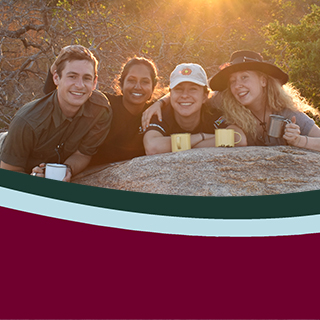Global Leadership Seminars
Fall 2022 Courses
Can Giving Change the World?: Engaging Social Responsibility through Philanthropy
Greg Larson- Monday, Wednesday, Friday 11:00-11:50 AM
This course examines the relationship between the individual and society by addressing the question: How do individuals and organizations address pressing social problems to create meaningful change? Through the lens of philanthropy, this course introduces students to social responsibility and some of the big problems facing society. We will learn about how philanthropists and social entrepreneurs are creatively combating the most pressing social problems, such as poverty, environmental degradation, and disease at local, national and global levels. A large portion of the course focuses on a hands-on grant-making project where the class will explore community needs, solicit grant proposals, visit prospective grant finalists and, ultimately, give away $10,000 in real money to local nonprofits.
Energy Conflict in a Changing Climate
Peter McDonough - Monday, Wednesday, Friday- 10:00-10:50 AM
Energy Conflict explores the wicked problems of a complex and ubiquitous energy system. Coal towns facing uncertain futures, nuclear power plants exploding, oil pipelines stuck in court, and the growing carbon footprint of the Global South all present logistical and ethical dilemmas. By exploring these conflicts, students will explore ideas of intergenerational justice, energy dependence, cultural trauma, equity, and much more in the context of climate change and globalization. Guiding questions, in-class activities, iterative discussions, and formal debates frame each major issue to paint a picture of informed leadership in situations where there are no “right” answers.
Extreme climate events: observations, vulnerability and preparedness.
Jinyang Du- Tuesdays and Thursdays 2:00-3:20 PM
Global society as a whole has become more vulnerable to climate extremes which are intensified under warming climate. Advances in satellite remote sensing and big data analysis provide new opportunities for detecting, analyzing, and predicting the extreme events. Students will understand the distribution, severity, trends, and causes of climate extremes and learn cutting-edge information technology for timely detecting, monitoring, and predicting the events. Based on the assessments of social-economic-environmental impacts, students will discuss innovative strategies to improve our preparedness for future climate extremes.
Global Challenges in Conservation and Restoration
Cara Nelson- Tuesday and Thursday 9:30-10:50 AM
Diplomacy is managing America's relationships with foreign governments and international organizations. Public diplomacy informs the world of who we are as Americans. Our nation's foreign policy is only successful if we use public diplomacy to learn about the people outside our borders and understand how they perceive our policies. You’ll learn how this is done through access to influential decision-makers as well as by engaging with students in Asia and/or the Middle East. Diversity and inclusion is a critical theme woven throughout. Assignments include simulating a press conference and developing a public diplomacy storytelling campaign to hone practical communication skills.
Music, Meaning and Manipulation
James Randall- Tuesdays and Thursdays 12:30-1:50 PM
We are inundated with music in our daily life, but few consider how it influences our thoughts and behaviors. In the media, music is used in sophisticated ways to sell us products, political candidates, and belief systems. We are being manipulated. While music may seem like magic, there’s a careful process behind it. This course examines research in the fields of musicology, neuroscience, anthropology, psychology, advertising, and film studies to understand the tricks of the trade. Assignments include short essays, class presentations, and group creative projects. No prior musical experience is required.
Telling True Stories: Global Perspectives of Settler Colonialism
Andi Hoelzel - Monday, Wednesday, Friday 9:00-9:50 AM
What is settler colonialism and how can an understanding of the concept help us address global issues and situate our own identities? Because neither white supremacy nor settler colonialism can be relegated to the past, together they inform present-day cultural, environmental, and political issues in the U.S. and abroad. In this course, students will engage with the multidisciplinary field of Settler Colonialism Studies through film, literature, podcasts, field trips, and additional media to situate critical global issues. Students will explore settler colonialism theory, examine projects of settler colonialism through case studies, and imagine the possibilities for a more just future.
Sustainable Development Goals 2030: Global Vision and Local Actions
Phyllis Ngai - Monday and Wednesday 2:00-3:20 PM
The 2030 Agenda for Sustainable Development, adopted by all U.N. member states, provides a blueprint aimed at bringing about sustained peace and prosperity for people and the planet. The Sustainable Development Goals capture a global vision for solving problems such as hunger, inequality, climate change, and shortage of clean water. Transnational-aid agencies condition sustainable-development initiatives through organizational priorities derived from their global perspectives. How do civil-society organizations around the world “translate” the global vision into local actions? Through collaborative-learning activities, students will explore what the SDGs mean in different places and how best to achieve a sustainable future for all (This class also fulfills a requirement for UM's International Development Studies Minor, for those interested in pursuing an additional credential.)
